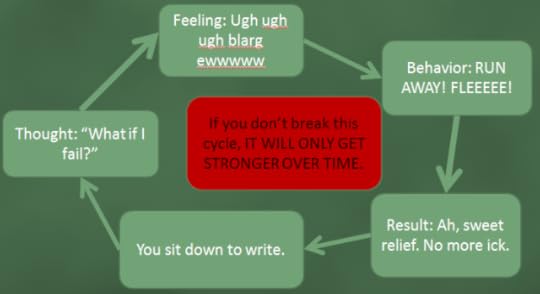Conquering Writer's Block V: THE CYCLE OF DOOM
Whoa. I have never done a blog series this long. For those of you who are just tuning in, here's what we've done so far:
Part I: The basic (cognitive-behavioral) model. Helps you understand where I'm coming from.
Part II: The three flavors of writer's block (based on an informal poll of writers).
Part III: First flavor: When life gets in the way. A process for determining how to take EFFECTIVE action against writer's block.
Part IV: Second flavor: Brain clog. What to do when your brain is stuck on the hamster wheel.
And today ... today we talk about something powerful and fascinating. Many, many writers I polled (and commenters since this series has begun), have indicated that one of the primary drivers of their writer's block seems to be avoidance. There are myriad thoughts that could lead a writer to develop this type of block, but some examples are:
Not wanting to write a particular scene for whatever reason (not fun, emotionally draining, etc.)Being REALLY aware of how far you have to go before you finish the book.Knowing you have to go back and rewrite huge swaths of story to get it right.Thinking about how likely it is that you will "fail" (however you define that--not getting an agent, not getting traditionally published, not getting positive feedback)Thinking that you're not very good at this whole writing thing ... so why bother.All those thoughts can cause intense internal squirminess. THIS IS THE CYCLE OF DOOM (start at the bottom with "You sit down to write":

Does this look familiar to you? If you think about it, you can probably substitute A LOT of things for "you sit down to write." Avoidance is a powerful and fairly universal behavioral process. The feeling of relief when we avoid something that makes us feel yucky is called "negative reinforcement." You've probably heard of "negative reinforcement" before, but I have to tell you, most people don't know what it really means. But now you know! It STRENGTHENS a behavior by removing something that feels bad.
In this case, it's the process of sitting down to write that feels bad, because it is associated with those uuuuuuuggggghhhhh thoughts.
Would you like to know what strengthens avoidance more than anything else? Would you like to know what will drive you into a deep, deeeeeep bout of writer's block?
Um, avoidance. Avoidance leads to more avoidance. The more you avoid, the more you avoid. Yeah.
This is how anxiety disorders are maintained, too, if you're wondering. Panic attacks, for example. Obsessive-compulsive behaviors as well. And the most effective treatment for them is the same:
Exposure. For anxiety disorders, cognitive behavioral therapy that includes an exposure component is considered a first line treatment. YES--not medication. Not simple talk therapy. Not visualization or deep breathing alone. Facing one's fears is effective if it's done the right way.
Exposure is the opposite of avoidance. And pretty much the only thing that can defeat it.
Exposure is not fun. We avoid stuff for a reason, right? BECAUSE IT FEELS BAD! Exposure involves sitting with whatever makes us feel that way and not running away from it. Not distracting ourselves from it. In other words, you have to ...
FEEL THE ICK.
It might look something like this:
 Or, hopefully, this:
Or, hopefully, this:

When you're dealing with the avoidance flavor of writer's block, there is only one way through it, and that's ... to go through it. To confront it head-on. That DOES NOT mean you ignore the thoughts that are making you avoid. It means the opposite! You have to acknowledge the thoughts, feel the feelings, and write anyway.
BICHOK, of course, means: Butt In Chair, Hands On Keyboard.
Typing your way through a block is not the solution to all types of writer's block, but if you've contracted a severe case of avoidance, it's really the only way through.
A few caveats, though!
Don't set yourself up to fail. This is actually one of the biggest mistakes I see when people decide to change. They set BIG goals because that's what they want to achieve. But successful change plans always do a few things:
Set the bar LOW. Start where you can succeed for sure. A chapter feels overwhelming? Start with a page. Is that too much? It's okay! Start with a paragraph! Still too much? No problem. Start with a sentence. Yeah, I'm serious. Early success is key to a successful change plan. Overambitious plans fail. I've seen it over and over again.
Reward, reward, reward. But make it small and manageable. Something you like to do every day. Don't go for a long-term reward at first. Don't do something like "if I write 20k words by the end of this week, I'll take myself out to dinner and a movie." It's too easy to fail early and give up completely. Instead, do something like, "I will write this paragraph, and then I will allow myself five minutes on Twitter" or whatever the small, daily (or hourly) reward is.
Rinse, repeat. You have to do this over and over again. Until you can sit there and think, "yes, I have a long way to go, and that feels UGH, but each step brings me closer to my goal." When you can do that, your writer's block will most likely will be gone.
Do not condemn yourself for failure. If you mess up once, you can't throw up your hands and say, "Oh, I might as well go back to my old avoidance habits." You have to shake that off and keep engaging with the ICK. Otherwise it will eat your brain. Really.
BUT--though you shouldn't be too hard on yourself, you also shouldn't set yourself up for it, as I said. Please trust me when I tell you to start out easy and move on from there (I'm serious--this is where I live professionally. I do know what I'm talking about). Remember that avoidance breeds avoidance, so if you make it too hard and end up avoiding to cope ... you've just made your problem BIGGER.
And that's it! Please let me know if you have questions about how to deal with the avoidance flavor (mmmm... bitter!) of writer's block.
On Wednesday, I'll tell you what I think of the phrase "Writer's block doesn't exist."
Part I: The basic (cognitive-behavioral) model. Helps you understand where I'm coming from.
Part II: The three flavors of writer's block (based on an informal poll of writers).
Part III: First flavor: When life gets in the way. A process for determining how to take EFFECTIVE action against writer's block.
Part IV: Second flavor: Brain clog. What to do when your brain is stuck on the hamster wheel.
And today ... today we talk about something powerful and fascinating. Many, many writers I polled (and commenters since this series has begun), have indicated that one of the primary drivers of their writer's block seems to be avoidance. There are myriad thoughts that could lead a writer to develop this type of block, but some examples are:
Not wanting to write a particular scene for whatever reason (not fun, emotionally draining, etc.)Being REALLY aware of how far you have to go before you finish the book.Knowing you have to go back and rewrite huge swaths of story to get it right.Thinking about how likely it is that you will "fail" (however you define that--not getting an agent, not getting traditionally published, not getting positive feedback)Thinking that you're not very good at this whole writing thing ... so why bother.All those thoughts can cause intense internal squirminess. THIS IS THE CYCLE OF DOOM (start at the bottom with "You sit down to write":

Does this look familiar to you? If you think about it, you can probably substitute A LOT of things for "you sit down to write." Avoidance is a powerful and fairly universal behavioral process. The feeling of relief when we avoid something that makes us feel yucky is called "negative reinforcement." You've probably heard of "negative reinforcement" before, but I have to tell you, most people don't know what it really means. But now you know! It STRENGTHENS a behavior by removing something that feels bad.
In this case, it's the process of sitting down to write that feels bad, because it is associated with those uuuuuuuggggghhhhh thoughts.
Would you like to know what strengthens avoidance more than anything else? Would you like to know what will drive you into a deep, deeeeeep bout of writer's block?
Um, avoidance. Avoidance leads to more avoidance. The more you avoid, the more you avoid. Yeah.
This is how anxiety disorders are maintained, too, if you're wondering. Panic attacks, for example. Obsessive-compulsive behaviors as well. And the most effective treatment for them is the same:
Exposure. For anxiety disorders, cognitive behavioral therapy that includes an exposure component is considered a first line treatment. YES--not medication. Not simple talk therapy. Not visualization or deep breathing alone. Facing one's fears is effective if it's done the right way.
Exposure is the opposite of avoidance. And pretty much the only thing that can defeat it.
Exposure is not fun. We avoid stuff for a reason, right? BECAUSE IT FEELS BAD! Exposure involves sitting with whatever makes us feel that way and not running away from it. Not distracting ourselves from it. In other words, you have to ...
FEEL THE ICK.
It might look something like this:
 Or, hopefully, this:
Or, hopefully, this:
When you're dealing with the avoidance flavor of writer's block, there is only one way through it, and that's ... to go through it. To confront it head-on. That DOES NOT mean you ignore the thoughts that are making you avoid. It means the opposite! You have to acknowledge the thoughts, feel the feelings, and write anyway.
BICHOK, of course, means: Butt In Chair, Hands On Keyboard.
Typing your way through a block is not the solution to all types of writer's block, but if you've contracted a severe case of avoidance, it's really the only way through.
A few caveats, though!
Don't set yourself up to fail. This is actually one of the biggest mistakes I see when people decide to change. They set BIG goals because that's what they want to achieve. But successful change plans always do a few things:
Set the bar LOW. Start where you can succeed for sure. A chapter feels overwhelming? Start with a page. Is that too much? It's okay! Start with a paragraph! Still too much? No problem. Start with a sentence. Yeah, I'm serious. Early success is key to a successful change plan. Overambitious plans fail. I've seen it over and over again.
Reward, reward, reward. But make it small and manageable. Something you like to do every day. Don't go for a long-term reward at first. Don't do something like "if I write 20k words by the end of this week, I'll take myself out to dinner and a movie." It's too easy to fail early and give up completely. Instead, do something like, "I will write this paragraph, and then I will allow myself five minutes on Twitter" or whatever the small, daily (or hourly) reward is.
Rinse, repeat. You have to do this over and over again. Until you can sit there and think, "yes, I have a long way to go, and that feels UGH, but each step brings me closer to my goal." When you can do that, your writer's block will most likely will be gone.
Do not condemn yourself for failure. If you mess up once, you can't throw up your hands and say, "Oh, I might as well go back to my old avoidance habits." You have to shake that off and keep engaging with the ICK. Otherwise it will eat your brain. Really.
BUT--though you shouldn't be too hard on yourself, you also shouldn't set yourself up for it, as I said. Please trust me when I tell you to start out easy and move on from there (I'm serious--this is where I live professionally. I do know what I'm talking about). Remember that avoidance breeds avoidance, so if you make it too hard and end up avoiding to cope ... you've just made your problem BIGGER.
And that's it! Please let me know if you have questions about how to deal with the avoidance flavor (mmmm... bitter!) of writer's block.
On Wednesday, I'll tell you what I think of the phrase "Writer's block doesn't exist."
Published on August 27, 2012 03:24
No comments have been added yet.



